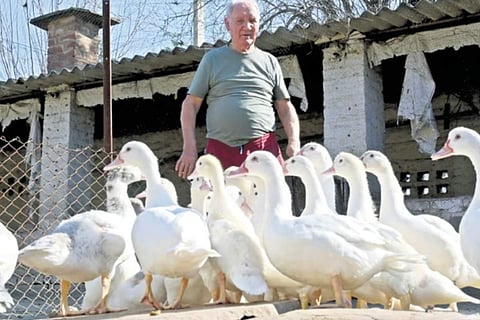Animal Farm by Roger Langbour
Roger Langbour, 82, has always had his ducks in a row. At 39, he decided he was going to retire from the military office attached with the French embassy in Delhi—he came to India in 1975—and become a farmer; this was just when he got a call for a Paris posting. “Not everyone wants to go to Paris,” he says.
But he did go back to France and get his farming degree. On returning home to Delhi – he is married to Anita Sinha, a Bengali – he bought a three-acre farm in 1994 at Bilaspur, Haryana, around 50 km from Delhi, and got his first breeder pig flown in, after three washes, from Kerala. With just one charcuterie in Delhi NCR then, he had offers from the likes of the legendary hotelier Bikki Oberoi to go big with pork products. “He told me if you do pork products we will buy one entire pig from you every day.” Langbour’s instincts told him to start with duck and chicken. And so he did.
His French Farm, which celebrates its 30th anniversary this year, has since the ’90s supplied to the city’s five-star hotels, families of Presidents, embassies, political families and increasingly, the well-travelled and upwardly mobile connoisseurs of Delhi. Romila Kumar, a retired Vasant Valley teacher, loves his fresh salad leaves; Hemant Sagar, of the Lecoanet-Hemant ready-to-wear fashion brand, orders in a chicken every week; entrepreneur and bon vivant Nina Pillai’s son swears by Langbour’s ducks and gets it made Duck a l’orange; David Housego, who co-owns the Shades of India brand with his wife Mandeep, regularly cooks a ‘magret de canard’ with a sauce of honey and red vinegar. But no farm, no story, Langbour pretty much suggests so, so we take the trip.
Starting the Peking duck market
It is afternoon when we drive into the farm. The scene is a happy pastoral— an owl dozes on a tree; plum and mulberry trees shade the vegetable patches; the Muscovy ducks gad about noiselessly; the Peking Ducks, unlike Chinese parliamentarians, do not practise silence; chickens chase each other in their pen. At some distance, to respect their feelings, we bite into one that has been roasted—its skin crispy, its flesh tender, fruity and elevated with seasonings; on its side sits a big bowl of the farm’s salad greens tossed in Balsamic vinegar, mustard and pepper. Langbour is a farmer but he can well be called the ‘father’ of the Peking duck market in Delhi as well. He tells TMS how that came to be.
At a time when he was looking around for a profession, Langbour found one in ducks. “There were hardly any foreign companies around then, my wife said do what you like. Rani Shaver, one of the first in north of India in the poultry business, were importing Chinese ducks but they were unable to find a market. I came to know about those ducks and decided to make a try with a flock of one-day-old ducklings.” Langbour met Oberoi with a new pitch and he threw up his hands in delight saying “At least someone tried to do something new!” And French Farm ducks started appearing on the Oberoi hotels’ menu; the word spread, and Langbour’s ducks and chickens flew all over India.
Solidarity with Indian farmers
But as the business prospered, the sharks landed up. Two of his breeder pigs were poisoned; that’s when he placed security guards at the farm gate. “So many people would drop in just to check what is going on, copy me, or plain eye the land. At some point I had to say this is not a zoo. Many who came and opened similar farms have since closed down because they felt that they could sit around while others would do the farming. That is not how it works, you have to work with the farmhands,” says Langbour.
There are things to learn on the job. For instance, when a pig gave birth to a litter of 20 one day, he mixed them up with the litter of another pig so that the feeding could be divided. “You don’t need to visit a vet for that,” he says.
Langbour is an Overseas Citizen of India; he feels invested in the country. The rumbles of the farmers’ protest creases his forehead. “Who is a farmer here? India has no school for farming, there is no future or incentive for the son of the farmer to be one. Like everywhere in the world, farmers are exploited and disregarded here.” It also takes a lot of passion to be a farmer, he says, and you have to give it time. “You can’t tell the birds, ‘Fend for yourselves, I need a holiday’,” he says.
At 82, Langbour, however, is on the lookout to sell the farm. He won’t be retiring though, until he has the right buyer. Is he half hopeful that his daughter who works in London may one day return and take over? It’s a question for the future, he says as the sun goes down and he gets up for our shoot.
By the watercress or spinach bed, he happily poses. He smiles with a pomelo, hut-huts the ducks. But he won’t hold a chick to his chest to look cute for the camera. Poultry farming is not a sentimental profession. When it is time for a corn-fed chicken to be turned into a roast or a duck to be confit, there will inevitably be blood. And Roger Langbour knows where to draw the line.

